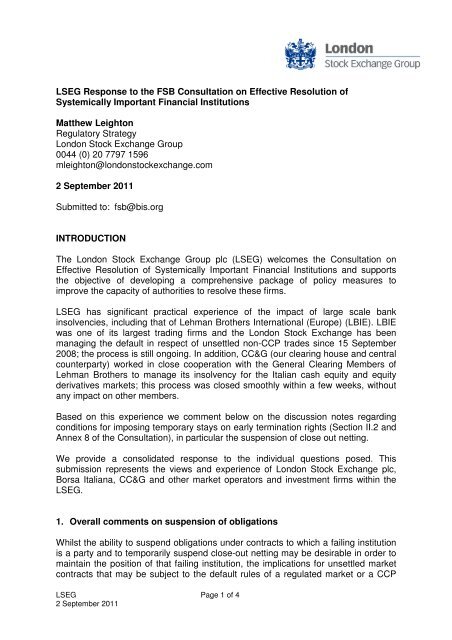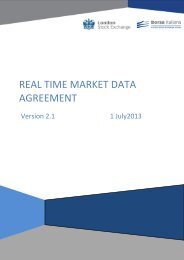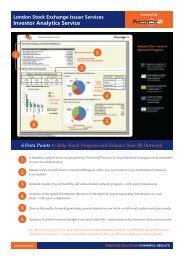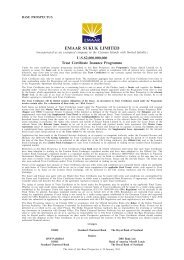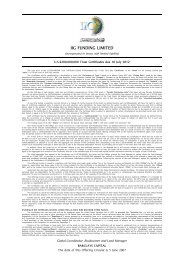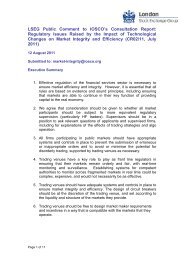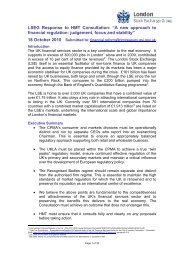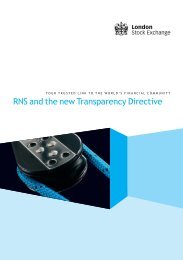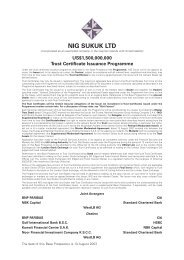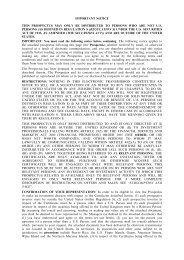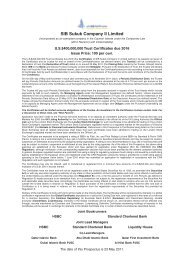LSEG Response to the FSB Consultation on SIFIs - London Stock ...
LSEG Response to the FSB Consultation on SIFIs - London Stock ...
LSEG Response to the FSB Consultation on SIFIs - London Stock ...
You also want an ePaper? Increase the reach of your titles
YUMPU automatically turns print PDFs into web optimized ePapers that Google loves.
<str<strong>on</strong>g>LSEG</str<strong>on</strong>g> <str<strong>on</strong>g>Resp<strong>on</strong>se</str<strong>on</strong>g> <str<strong>on</strong>g>to</str<strong>on</strong>g> <str<strong>on</strong>g>the</str<strong>on</strong>g> <str<strong>on</strong>g>FSB</str<strong>on</strong>g> <str<strong>on</strong>g>C<strong>on</strong>sultati<strong>on</strong></str<strong>on</strong>g> <strong>on</strong> Effective Resoluti<strong>on</strong> ofSystemically Important Financial Instituti<strong>on</strong>sMat<str<strong>on</strong>g>the</str<strong>on</strong>g>w Leigh<str<strong>on</strong>g>to</str<strong>on</strong>g>nRegula<str<strong>on</strong>g>to</str<strong>on</strong>g>ry StrategyL<strong>on</strong>d<strong>on</strong> S<str<strong>on</strong>g>to</str<strong>on</strong>g>ck Exchange Group0044 (0) 20 7797 1596mleigh<str<strong>on</strong>g>to</str<strong>on</strong>g>n@l<strong>on</strong>d<strong>on</strong>s<str<strong>on</strong>g>to</str<strong>on</strong>g>ckexchange.com2 September 2011Submitted <str<strong>on</strong>g>to</str<strong>on</strong>g>: fsb@bis.orgINTRODUCTIONThe L<strong>on</strong>d<strong>on</strong> S<str<strong>on</strong>g>to</str<strong>on</strong>g>ck Exchange Group plc (<str<strong>on</strong>g>LSEG</str<strong>on</strong>g>) welcomes <str<strong>on</strong>g>the</str<strong>on</strong>g> <str<strong>on</strong>g>C<strong>on</strong>sultati<strong>on</strong></str<strong>on</strong>g> <strong>on</strong>Effective Resoluti<strong>on</strong> of Systemically Important Financial Instituti<strong>on</strong>s and supports<str<strong>on</strong>g>the</str<strong>on</strong>g> objective of developing a comprehensive package of policy measures <str<strong>on</strong>g>to</str<strong>on</strong>g>improve <str<strong>on</strong>g>the</str<strong>on</strong>g> capacity of authorities <str<strong>on</strong>g>to</str<strong>on</strong>g> resolve <str<strong>on</strong>g>the</str<strong>on</strong>g>se firms.<str<strong>on</strong>g>LSEG</str<strong>on</strong>g> has significant practical experience of <str<strong>on</strong>g>the</str<strong>on</strong>g> impact of large scale bankinsolvencies, including that of Lehman Bro<str<strong>on</strong>g>the</str<strong>on</strong>g>rs Internati<strong>on</strong>al (Europe) (LBIE). LBIEwas <strong>on</strong>e of its largest trading firms and <str<strong>on</strong>g>the</str<strong>on</strong>g> L<strong>on</strong>d<strong>on</strong> S<str<strong>on</strong>g>to</str<strong>on</strong>g>ck Exchange has beenmanaging <str<strong>on</strong>g>the</str<strong>on</strong>g> default in respect of unsettled n<strong>on</strong>-CCP trades since 15 September2008; <str<strong>on</strong>g>the</str<strong>on</strong>g> process is still <strong>on</strong>going. In additi<strong>on</strong>, CC&G (our clearing house and centralcounterparty) worked in close cooperati<strong>on</strong> with <str<strong>on</strong>g>the</str<strong>on</strong>g> General Clearing Members ofLehman Bro<str<strong>on</strong>g>the</str<strong>on</strong>g>rs <str<strong>on</strong>g>to</str<strong>on</strong>g> manage its insolvency for <str<strong>on</strong>g>the</str<strong>on</strong>g> Italian cash equity and equityderivatives markets; this process was closed smoothly within a few weeks, withoutany impact <strong>on</strong> o<str<strong>on</strong>g>the</str<strong>on</strong>g>r members.Based <strong>on</strong> this experience we comment below <strong>on</strong> <str<strong>on</strong>g>the</str<strong>on</strong>g> discussi<strong>on</strong> notes regardingc<strong>on</strong>diti<strong>on</strong>s for imposing temporary stays <strong>on</strong> early terminati<strong>on</strong> rights (Secti<strong>on</strong> II.2 andAnnex 8 of <str<strong>on</strong>g>the</str<strong>on</strong>g> <str<strong>on</strong>g>C<strong>on</strong>sultati<strong>on</strong></str<strong>on</strong>g>), in particular <str<strong>on</strong>g>the</str<strong>on</strong>g> suspensi<strong>on</strong> of close out netting.We provide a c<strong>on</strong>solidated resp<strong>on</strong>se <str<strong>on</strong>g>to</str<strong>on</strong>g> <str<strong>on</strong>g>the</str<strong>on</strong>g> individual questi<strong>on</strong>s posed. Thissubmissi<strong>on</strong> represents <str<strong>on</strong>g>the</str<strong>on</strong>g> views and experience of L<strong>on</strong>d<strong>on</strong> S<str<strong>on</strong>g>to</str<strong>on</strong>g>ck Exchange plc,Borsa Italiana, CC&G and o<str<strong>on</strong>g>the</str<strong>on</strong>g>r market opera<str<strong>on</strong>g>to</str<strong>on</strong>g>rs and investment firms within <str<strong>on</strong>g>the</str<strong>on</strong>g><str<strong>on</strong>g>LSEG</str<strong>on</strong>g>.1. Overall comments <strong>on</strong> suspensi<strong>on</strong> of obligati<strong>on</strong>sWhilst <str<strong>on</strong>g>the</str<strong>on</strong>g> ability <str<strong>on</strong>g>to</str<strong>on</strong>g> suspend obligati<strong>on</strong>s under c<strong>on</strong>tracts <str<strong>on</strong>g>to</str<strong>on</strong>g> which a failing instituti<strong>on</strong>is a party and <str<strong>on</strong>g>to</str<strong>on</strong>g> temporarily suspend close-out netting may be desirable in order <str<strong>on</strong>g>to</str<strong>on</strong>g>maintain <str<strong>on</strong>g>the</str<strong>on</strong>g> positi<strong>on</strong> of that failing instituti<strong>on</strong>, <str<strong>on</strong>g>the</str<strong>on</strong>g> implicati<strong>on</strong>s for unsettled marketc<strong>on</strong>tracts that may be subject <str<strong>on</strong>g>to</str<strong>on</strong>g> <str<strong>on</strong>g>the</str<strong>on</strong>g> default rules of a regulated market or a CCP<str<strong>on</strong>g>LSEG</str<strong>on</strong>g> Page 1 of 42 September 2011
<str<strong>on</strong>g>LSEG</str<strong>on</strong>g> <str<strong>on</strong>g>Resp<strong>on</strong>se</str<strong>on</strong>g> <str<strong>on</strong>g>to</str<strong>on</strong>g> <str<strong>on</strong>g>C<strong>on</strong>sultati<strong>on</strong></str<strong>on</strong>g> <strong>on</strong> Effective Resoluti<strong>on</strong> of Systemically Important FinancialInstituti<strong>on</strong>smust not be overlooked. Nor should <str<strong>on</strong>g>the</str<strong>on</strong>g> rights of n<strong>on</strong>-failing counterparties <str<strong>on</strong>g>to</str<strong>on</strong>g> treat afailing party as in default under a bi-laterally negotiated c<strong>on</strong>tract. Often, <str<strong>on</strong>g>the</str<strong>on</strong>g> right <str<strong>on</strong>g>to</str<strong>on</strong>g>treat a party or member of an exchange or clearing house as being in default doesnot depend <strong>on</strong> a technical act of insolvency but may simply be a failure <str<strong>on</strong>g>to</str<strong>on</strong>g> pay for, ordeliver, securities (or <str<strong>on</strong>g>the</str<strong>on</strong>g> likelihood that such an event will occur). We <str<strong>on</strong>g>the</str<strong>on</strong>g>reforeagree with <str<strong>on</strong>g>the</str<strong>on</strong>g> <str<strong>on</strong>g>FSB</str<strong>on</strong>g>’s argument that a stay should not extend <str<strong>on</strong>g>to</str<strong>on</strong>g> all payment anddelivery obligati<strong>on</strong>s and would not prevent close-out for reas<strong>on</strong>s of failure <str<strong>on</strong>g>to</str<strong>on</strong>g> pay ordeliver. Never<str<strong>on</strong>g>the</str<strong>on</strong>g>less, any rules allowing <str<strong>on</strong>g>the</str<strong>on</strong>g> effective freezing of financial marketsc<strong>on</strong>tracts must be carefully designed so as not <str<strong>on</strong>g>to</str<strong>on</strong>g> frustrate <str<strong>on</strong>g>the</str<strong>on</strong>g> operati<strong>on</strong> of anydefault rules and cus<str<strong>on</strong>g>to</str<strong>on</strong>g>m and practice in various financial markets.2. Specific points <strong>on</strong> <str<strong>on</strong>g>the</str<strong>on</strong>g> suspensi<strong>on</strong> of close out netting2.1. Financial stability/systemic riskThe primary functi<strong>on</strong> of a CCP is <str<strong>on</strong>g>to</str<strong>on</strong>g> minimise systemic risk by removing <str<strong>on</strong>g>the</str<strong>on</strong>g> creditrisk of a defaulting participant from <str<strong>on</strong>g>the</str<strong>on</strong>g> market. It is, <str<strong>on</strong>g>the</str<strong>on</strong>g>refore, essential that all of<str<strong>on</strong>g>the</str<strong>on</strong>g> regula<str<strong>on</strong>g>to</str<strong>on</strong>g>ry initiatives with which central counterparties (CCPs) are required <str<strong>on</strong>g>to</str<strong>on</strong>g>comply are coordinated. In particular, a crisis management framework shouldensure that no unnecessary obstacles are imposed that c<strong>on</strong>tradict, and <str<strong>on</strong>g>the</str<strong>on</strong>g>rebyundermine, <str<strong>on</strong>g>the</str<strong>on</strong>g> overall objectives outlined by <str<strong>on</strong>g>the</str<strong>on</strong>g> G20 <str<strong>on</strong>g>to</str<strong>on</strong>g> create incentives <str<strong>on</strong>g>to</str<strong>on</strong>g> useCCPs.An important aspect of clearing transacti<strong>on</strong>s through a CCP is <str<strong>on</strong>g>the</str<strong>on</strong>g> manda<str<strong>on</strong>g>to</str<strong>on</strong>g>rycollateralisati<strong>on</strong> of risk positi<strong>on</strong>s of <str<strong>on</strong>g>the</str<strong>on</strong>g> clearing member as counterparty <str<strong>on</strong>g>to</str<strong>on</strong>g> a CCPand <str<strong>on</strong>g>the</str<strong>on</strong>g> <strong>on</strong>-going calculati<strong>on</strong> of required collateral (margining) for open positi<strong>on</strong>s.These margins form part of <str<strong>on</strong>g>the</str<strong>on</strong>g> risk management functi<strong>on</strong> of <str<strong>on</strong>g>the</str<strong>on</strong>g> CCP whereby, in<str<strong>on</strong>g>the</str<strong>on</strong>g> event of a default (of a clearing member), all open positi<strong>on</strong>s of that clearingmember can be closed or liquidated, or losses can be balanced. Any delay in <str<strong>on</strong>g>the</str<strong>on</strong>g>operati<strong>on</strong> of this procedure through suspensi<strong>on</strong>s of rights, even temporary, couldhave serious effects <strong>on</strong> <str<strong>on</strong>g>the</str<strong>on</strong>g> operati<strong>on</strong> of a CCP as a key infrastructure in <str<strong>on</strong>g>the</str<strong>on</strong>g>financial markets and subsequently have significant detrimental effects <strong>on</strong> <str<strong>on</strong>g>the</str<strong>on</strong>g> wholefinancial system.Any limitati<strong>on</strong>s imposed in terms of suspensi<strong>on</strong> of payments and delivery obligati<strong>on</strong>sshould not restrict <str<strong>on</strong>g>the</str<strong>on</strong>g> CCP from acting appropriately in a default situati<strong>on</strong>, i.e.providing client asset protecti<strong>on</strong> via a close-out netting mechanism and performingpayments and delivery obligati<strong>on</strong>s in time <str<strong>on</strong>g>to</str<strong>on</strong>g> avoid market disrupti<strong>on</strong>s. Any limitati<strong>on</strong>of <str<strong>on</strong>g>the</str<strong>on</strong>g> close-out right could lead <str<strong>on</strong>g>to</str<strong>on</strong>g> a disadvantage for a CCP and might potentiallyendanger <str<strong>on</strong>g>the</str<strong>on</strong>g> stability of <str<strong>on</strong>g>the</str<strong>on</strong>g> CCP and subsequently <str<strong>on</strong>g>the</str<strong>on</strong>g> financial market.2.2. Provisi<strong>on</strong>s in nati<strong>on</strong>al legislati<strong>on</strong>In some countries, nati<strong>on</strong>al legislati<strong>on</strong> recognises <str<strong>on</strong>g>the</str<strong>on</strong>g> need for market infrastructure<str<strong>on</strong>g>to</str<strong>on</strong>g> operate default procedures and is designed <str<strong>on</strong>g>to</str<strong>on</strong>g> safeguard <str<strong>on</strong>g>the</str<strong>on</strong>g> operati<strong>on</strong> offinancial markets. For example, in <str<strong>on</strong>g>the</str<strong>on</strong>g> UK 1 this is achieved by modifying domestic1 Part 7 of <str<strong>on</strong>g>the</str<strong>on</strong>g> UK Companies Act 1989<str<strong>on</strong>g>LSEG</str<strong>on</strong>g> Page 2 of 42 September 2011
<str<strong>on</strong>g>LSEG</str<strong>on</strong>g> <str<strong>on</strong>g>Resp<strong>on</strong>se</str<strong>on</strong>g> <str<strong>on</strong>g>to</str<strong>on</strong>g> <str<strong>on</strong>g>C<strong>on</strong>sultati<strong>on</strong></str<strong>on</strong>g> <strong>on</strong> Effective Resoluti<strong>on</strong> of Systemically Important FinancialInstituti<strong>on</strong>sinsolvency law <str<strong>on</strong>g>to</str<strong>on</strong>g> give priority <str<strong>on</strong>g>to</str<strong>on</strong>g>, and <str<strong>on</strong>g>to</str<strong>on</strong>g> protect, <str<strong>on</strong>g>the</str<strong>on</strong>g> acti<strong>on</strong>s of Recognised ClearingHouses (RCH) and Recognised Investment Exchanges (RIE) 2 in <str<strong>on</strong>g>the</str<strong>on</strong>g> operati<strong>on</strong> of<str<strong>on</strong>g>the</str<strong>on</strong>g>ir default rules applied when a member defaults <strong>on</strong> <str<strong>on</strong>g>the</str<strong>on</strong>g>ir obligati<strong>on</strong>s.The protecti<strong>on</strong>s given <str<strong>on</strong>g>to</str<strong>on</strong>g> RCHs and RIEs enable <str<strong>on</strong>g>the</str<strong>on</strong>g>m <str<strong>on</strong>g>to</str<strong>on</strong>g> take acti<strong>on</strong> <str<strong>on</strong>g>to</str<strong>on</strong>g> close out adefaulter’s unsettled market c<strong>on</strong>tracts in accordance with <str<strong>on</strong>g>the</str<strong>on</strong>g>ir default rules. Thismay include offsetting profits and losses <strong>on</strong> different c<strong>on</strong>tracts and setting off assetsprovided as margin against net losses. The liquida<str<strong>on</strong>g>to</str<strong>on</strong>g>r for <str<strong>on</strong>g>the</str<strong>on</strong>g> defaulter is preventedfrom unpicking, or disclaiming, <str<strong>on</strong>g>the</str<strong>on</strong>g>se transacti<strong>on</strong>s.Similar provisi<strong>on</strong>s are also in force in Italy: <str<strong>on</strong>g>the</str<strong>on</strong>g> market insolvency discipline isprovided under <str<strong>on</strong>g>the</str<strong>on</strong>g> C<strong>on</strong>solidated Law <strong>on</strong> Finance and is governed throughregulati<strong>on</strong> by C<strong>on</strong>sob, by agreement with <str<strong>on</strong>g>the</str<strong>on</strong>g> Bank of Italy 3 . Such regulati<strong>on</strong>sexpressly ensure that close-out netting clauses are valid and take effect incompliance with <str<strong>on</strong>g>the</str<strong>on</strong>g> provisi<strong>on</strong>s established by CCPs and Recognised Exchanges,including in <str<strong>on</strong>g>the</str<strong>on</strong>g> event of opening res<str<strong>on</strong>g>to</str<strong>on</strong>g>rati<strong>on</strong> or liquidati<strong>on</strong> proceedings with regards<str<strong>on</strong>g>to</str<strong>on</strong>g> an insolvent market counterparty.These protecti<strong>on</strong>s safeguard <str<strong>on</strong>g>the</str<strong>on</strong>g> integrity of financial markets, and public c<strong>on</strong>fidencein <str<strong>on</strong>g>the</str<strong>on</strong>g>m, by minimising <str<strong>on</strong>g>the</str<strong>on</strong>g> disrupti<strong>on</strong> caused by <str<strong>on</strong>g>the</str<strong>on</strong>g> default of <str<strong>on</strong>g>the</str<strong>on</strong>g> member of aclearing house or <str<strong>on</strong>g>the</str<strong>on</strong>g> member of an exchange. They are designed <str<strong>on</strong>g>to</str<strong>on</strong>g> try and ensurethat <str<strong>on</strong>g>the</str<strong>on</strong>g> market is immunised against repercussive effects from an individualinsolvency or default, and ultimately against systemic failure.Clearing houses that act as central counterparties manage <str<strong>on</strong>g>the</str<strong>on</strong>g> risk that clearingmember counterparties <str<strong>on</strong>g>to</str<strong>on</strong>g> market trades will become unable <str<strong>on</strong>g>to</str<strong>on</strong>g> fulfil <str<strong>on</strong>g>the</str<strong>on</strong>g>ir obligati<strong>on</strong>swhen <str<strong>on</strong>g>the</str<strong>on</strong>g>y become due. The operati<strong>on</strong> of <str<strong>on</strong>g>the</str<strong>on</strong>g>ir default rules is central <str<strong>on</strong>g>to</str<strong>on</strong>g> <str<strong>on</strong>g>the</str<strong>on</strong>g>ir ability<str<strong>on</strong>g>to</str<strong>on</strong>g> manage <str<strong>on</strong>g>the</str<strong>on</strong>g> risks that <str<strong>on</strong>g>the</str<strong>on</strong>g>y assume. To <str<strong>on</strong>g>the</str<strong>on</strong>g> extent that <str<strong>on</strong>g>the</str<strong>on</strong>g>y are unable <str<strong>on</strong>g>to</str<strong>on</strong>g> enforce<str<strong>on</strong>g>the</str<strong>on</strong>g>ir default rules, <str<strong>on</strong>g>the</str<strong>on</strong>g> benefits and ec<strong>on</strong>omic efficiency of <str<strong>on</strong>g>the</str<strong>on</strong>g>ir role in <str<strong>on</strong>g>the</str<strong>on</strong>g> marketwould be compromised.2.3. Impact <strong>on</strong> collateral requirements and costs of tradingAny stay or mora<str<strong>on</strong>g>to</str<strong>on</strong>g>rium <strong>on</strong> close-out netting will prevent <str<strong>on</strong>g>the</str<strong>on</strong>g> CCP from taking acti<strong>on</strong><str<strong>on</strong>g>to</str<strong>on</strong>g> close out positi<strong>on</strong>s and apply collateral (in whatever form) <str<strong>on</strong>g>to</str<strong>on</strong>g> offset realisedliabilities. During this time <str<strong>on</strong>g>the</str<strong>on</strong>g> markets will c<strong>on</strong>tinue <str<strong>on</strong>g>to</str<strong>on</strong>g> trade – or even if <str<strong>on</strong>g>the</str<strong>on</strong>g>y do not,prices will change – and <str<strong>on</strong>g>the</str<strong>on</strong>g> values of both <str<strong>on</strong>g>the</str<strong>on</strong>g> positi<strong>on</strong>s and of <str<strong>on</strong>g>the</str<strong>on</strong>g> collateral willremain volatile. A stay <strong>on</strong> <str<strong>on</strong>g>the</str<strong>on</strong>g> acti<strong>on</strong>s of a CCP <str<strong>on</strong>g>to</str<strong>on</strong>g> take <str<strong>on</strong>g>the</str<strong>on</strong>g>se steps will increase <str<strong>on</strong>g>the</str<strong>on</strong>g>likelihood that <str<strong>on</strong>g>the</str<strong>on</strong>g> margin that it holds from <str<strong>on</strong>g>the</str<strong>on</strong>g> defaulter may be insufficient <str<strong>on</strong>g>to</str<strong>on</strong>g> coverany losses and so <str<strong>on</strong>g>the</str<strong>on</strong>g> CCP will be forced <str<strong>on</strong>g>to</str<strong>on</strong>g> mutualise <str<strong>on</strong>g>the</str<strong>on</strong>g> loss through its defaultfund.When operating under its default Rules or similar provisi<strong>on</strong>s, it is vitally importantthat a CCP can take whatever acti<strong>on</strong>s it chooses in order <str<strong>on</strong>g>to</str<strong>on</strong>g> protect survivingclearing members, clients of <str<strong>on</strong>g>the</str<strong>on</strong>g> defaulting member and <str<strong>on</strong>g>the</str<strong>on</strong>g> CCP itself. In <str<strong>on</strong>g>the</str<strong>on</strong>g>sesituati<strong>on</strong>s a CCP’s primary defence is <str<strong>on</strong>g>the</str<strong>on</strong>g> collateral held as margin for <str<strong>on</strong>g>the</str<strong>on</strong>g> cleared2 As defined in <str<strong>on</strong>g>the</str<strong>on</strong>g> UK by <str<strong>on</strong>g>the</str<strong>on</strong>g> Financial Services and Markets Act 2000 (Recogniti<strong>on</strong> Requirementsfor Investment Exchanges and Clearing Houses) Regulati<strong>on</strong>s 20013 C<strong>on</strong>solidated Law <strong>on</strong> Finance, Article 72, Market insolvency regulati<strong>on</strong>s<str<strong>on</strong>g>LSEG</str<strong>on</strong>g> Page 3 of 42 September 2011
<str<strong>on</strong>g>LSEG</str<strong>on</strong>g> <str<strong>on</strong>g>Resp<strong>on</strong>se</str<strong>on</strong>g> <str<strong>on</strong>g>to</str<strong>on</strong>g> <str<strong>on</strong>g>C<strong>on</strong>sultati<strong>on</strong></str<strong>on</strong>g> <strong>on</strong> Effective Resoluti<strong>on</strong> of Systemically Important FinancialInstituti<strong>on</strong>spositi<strong>on</strong>s, which under all but <str<strong>on</strong>g>the</str<strong>on</strong>g> most extreme circumstances should suffice <str<strong>on</strong>g>to</str<strong>on</strong>g>enable close-out or transfer of a member’s positi<strong>on</strong>s.In order <str<strong>on</strong>g>to</str<strong>on</strong>g> determine how much margin (and default fund) is necessary, and alsowhat liquidity facilities a CCP needs, it will make judgements about how l<strong>on</strong>g it couldtake <str<strong>on</strong>g>to</str<strong>on</strong>g> execute offsetting positi<strong>on</strong>s (whe<str<strong>on</strong>g>the</str<strong>on</strong>g>r <strong>on</strong> organised markets or over-<str<strong>on</strong>g>the</str<strong>on</strong>g>counter)and <str<strong>on</strong>g>to</str<strong>on</strong>g> realise collateral. If this period were <str<strong>on</strong>g>to</str<strong>on</strong>g> be l<strong>on</strong>ger as <str<strong>on</strong>g>the</str<strong>on</strong>g> result ofallowing for a potential suspensi<strong>on</strong> of close out netting <str<strong>on</strong>g>the</str<strong>on</strong>g>n margin levels willincrease. As an example, we estimate that doubling <str<strong>on</strong>g>the</str<strong>on</strong>g> time required <str<strong>on</strong>g>to</str<strong>on</strong>g> be able <str<strong>on</strong>g>to</str<strong>on</strong>g>complete a close out would lead <str<strong>on</strong>g>to</str<strong>on</strong>g> an increase in margin levels of approximately40%, although this could be higher in times of volatile markets under stress, whereprices could fall for a significant number of c<strong>on</strong>secutive days. This increase wouldhave <str<strong>on</strong>g>to</str<strong>on</strong>g> be applied at all times, given that defaults are not predictable.Any provisi<strong>on</strong> that has <str<strong>on</strong>g>the</str<strong>on</strong>g> effect of preventing a CCP from taking <str<strong>on</strong>g>the</str<strong>on</strong>g>se acti<strong>on</strong>simmediately up<strong>on</strong> <str<strong>on</strong>g>the</str<strong>on</strong>g> declarati<strong>on</strong> of its member’s default will both introduce greateruncertainty in, and disrupti<strong>on</strong> <str<strong>on</strong>g>to</str<strong>on</strong>g>, <str<strong>on</strong>g>the</str<strong>on</strong>g> affected markets and significantly increase <str<strong>on</strong>g>the</str<strong>on</strong>g>margin and <str<strong>on</strong>g>the</str<strong>on</strong>g>refore collateral requirements that a CCP is likely <str<strong>on</strong>g>to</str<strong>on</strong>g> require from itsmembers (and which its members will require from <str<strong>on</strong>g>the</str<strong>on</strong>g>ir clients). As a result, <str<strong>on</strong>g>the</str<strong>on</strong>g>costs of trading will increase.2.4. Exempti<strong>on</strong> from temporary suspensi<strong>on</strong> of obligati<strong>on</strong>sAs we argue above, any temporary suspensi<strong>on</strong> of early terminati<strong>on</strong> rights couldaffect a CCP’s ability (and also that of o<str<strong>on</strong>g>the</str<strong>on</strong>g>r infrastructure providers such asSecurity Settlement Systems, payment systems and Regulated Markets) <str<strong>on</strong>g>to</str<strong>on</strong>g> manage<str<strong>on</strong>g>the</str<strong>on</strong>g> risk it faces in <str<strong>on</strong>g>the</str<strong>on</strong>g> case of a default of <strong>on</strong>e of its clearing members. Any crisismanagement framework must, <str<strong>on</strong>g>the</str<strong>on</strong>g>refore, be carefully designed so as not <str<strong>on</strong>g>to</str<strong>on</strong>g> frustrate<str<strong>on</strong>g>the</str<strong>on</strong>g> operati<strong>on</strong> of any default rules.Accordingly, as part of such a framework, we believe that <str<strong>on</strong>g>the</str<strong>on</strong>g>re is a str<strong>on</strong>g case forexempting CCPs and o<str<strong>on</strong>g>the</str<strong>on</strong>g>r infrastructure providers from any provisi<strong>on</strong>s for <str<strong>on</strong>g>the</str<strong>on</strong>g>suspensi<strong>on</strong> of obligati<strong>on</strong>s <str<strong>on</strong>g>to</str<strong>on</strong>g> protect <str<strong>on</strong>g>the</str<strong>on</strong>g>ir unique role and functi<strong>on</strong> as part of <str<strong>on</strong>g>the</str<strong>on</strong>g>financial market infrastructure.<str<strong>on</strong>g>LSEG</str<strong>on</strong>g> Page 4 of 42 September 2011


